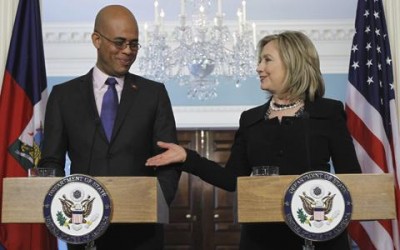OAS Insider Reveals Details of Illegal Foreign Intervention Against Haitian Democracy
Detailed Account of Proposed Coup Against Préval; Overturning of Haitian Elections

In 2010, a secret “core group” of foreign dignitaries sought to force the president of Haiti out of office in a coup. They also engineered an intervention in Haiti’s presidential elections that year that ensured that the governing party’s candidate would not proceed to a runoff. These are the revelations being made by the Organization of American States’ (OAS) Special Representative to Haiti at the time, Ricardo Seitenfus. In an exclusive interview published by Dissent Magazine, Seitenfus – who was present at some of these meetings – describes these and other bombshells detailed in his new book being published in his native Brazil, titled International Crossroads and Failures in Haiti.
In the written interview with Dan Beeton of the Center for Economic and Policy Research (CEPR) and journalist Georgianne Nienaber, Seitenfus provides new details regarding threats against then-president of Haiti René Préval. Seitenfus also corroborates the conclusions of CEPR’s earlier analysis of an OAS “Expert” Mission sent to verify the election: that the OAS overturned the results of the first round in a political intervention. The OAS took this unprecedented step without so much as a recount or calling for a new election, something that had never been done before by an international body. This was a “white coup and a blatant electoral intervention,” Seitenfus says.
“[W]hen it comes to Haiti, the international community does not have limits for the actions it takes,” Seitenfus writes in the interview.
The OAS “Expert” Mission, most of its members coming from the U.S., Canada and France, recommended changing the result of the first round of the election after findings that CEPR’s analysis determined to be “methodologically and statistically flawed, and arbitrary.” The international community – especially the U.S. government – then exerted strong pressure for the Haitian government to accept the mission’s recommendations, which would remove governing party candidate Jude Célestin from the runoff, to be replaced by Michel Martelly. Martelly went on to win the second round of an election versus another conservative opponent, Mirlande Manigat, with less than 17 percent of the vote from the eligible electorate.
Seitenfus’ account of events corroborates the results of this statistical analysis:
It was necessary to change the result of the first round. The only possibility was to annul the results in certain ballot boxes that favored Célestin. That way, he would fall back to third place at the same time that the candidate anointed by the international community would go on to participate in the second round, along with Mirlande Manigat.
Seitenfus names names in a blow-by-blow account of a secret discussion on whether Préval should be removed from office, which he says would have been “a moral disgrace and a gross political error.” In his account, Seitenfus says that then-head of the U.N. Mission in Haiti (MINUSTAH) Edmond Mulet told Préval he would have to “leave the presidency and abandon Haiti.” Seitenfus also suggests that the U.S. Ambassador to Haiti at the time, Kenneth Merten, supported forcing Préval out of office. Ultimately, the ambassadors of Brazil and Argentina – and Seitenfus himself – opposed the plan, he says, and it was dropped.
In the full interview (available on CEPR’s Haiti: Relief and Reconstruction Watch blog), Seitenfus also levels sharp criticism at the U.N., the OAS, the U.S. government and other key actors in Haiti, laments the lack of coordination among large NGOs and international organizations, and praises PetroCaribe and other assistance from Venezuela, which he describes as “a counter model to traditional development aid from the developed countries and international organizations” that has “take[n] away from the Haitian state the little financial autonomy that it possesses.”

